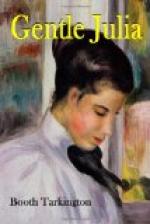“You’re makin’ a big mistake!” Henry Rooter called after him. “You won’t see any apple dumplings, I bet a hunderd dollars! You better come on home with me.”
Herbert no more than half opened his front door before he perceived that his friend’s advice had been excellent. So clearly Herbert perceived this, that he impulsively decided not to open the door any farther, but on the contrary to close it and retire; and he would have done so, had his mother not reached forth and detained him. She was, in fact, just inside that door, standing in the hall with one of his great-aunts, one of his aunts, two aunts-by-marriage, and an elderly unmarried cousin, who were all just on the point of leaving. However, they changed their minds and decided to remain, now that Herbert was among them.
The captive’s father joined them, a few minutes later, but it had already become clear to Herbert that The North End Daily Oriole was in one sense a thing of the past, though in another sense this former owner and proprietor was certain that he would never hear the last of it. However, on account of the life of blackmail and slavery now led by the members of the old regime, the Oriole’s extinction was far less painful to Herbert than his father supposed; and the latter wasted a great deal of severity, insisting that the printing-press should be returned that very night to Uncle Joseph. Herbert’s heartiest retrospective wish was that the ole printing-press had been returned to Uncle Joseph long ago.
“If you can find him to give it to!” Aunt Harriet suggested. “Nobody knows where he goes when he gets the way he did this afternoon when we were discussing it with him! I only hope he’ll be back to-night!”
“He can’t stay away forever,” Aunt Fanny remarked. “That garage is charging him five dollars an hour for the automobile he’s in, and surely even Joseph will decide there’s a limit to wildness some time!”
“I don’t care when he comes back,” Herbert’s father declared grimly. “Whenever he does he’s got to take that printing-press back—and Herbert will be let out of the house long enough to carry it over. His mother or I will go with him.”
Herbert bore much more than this. He had seated himself on the third step of the stairway, and maintained as much dogged silence as he could. Once, however, they got a yelp of anguish out of him. It was when Cousin Virginia said: “Oh, Herbert, Herbert! How could you make up that terrible falsehood about Mr. Crum? And, think of it; right on the same page with your cousin Florence’s pure little poem!”
Herbert uttered sounds incoherent but loud, and expressive of a supreme physical revulsion. The shocked audience readily understood that he liked neither Cousin Virginia’s chiding nor Cousin Florence’s pure little poem.
“Shame!” said his father.
Herbert controlled himself. It could be seen that his spirit was broken, when Aunt Fanny mourned, shaking her head at him, smiling ruefully:




